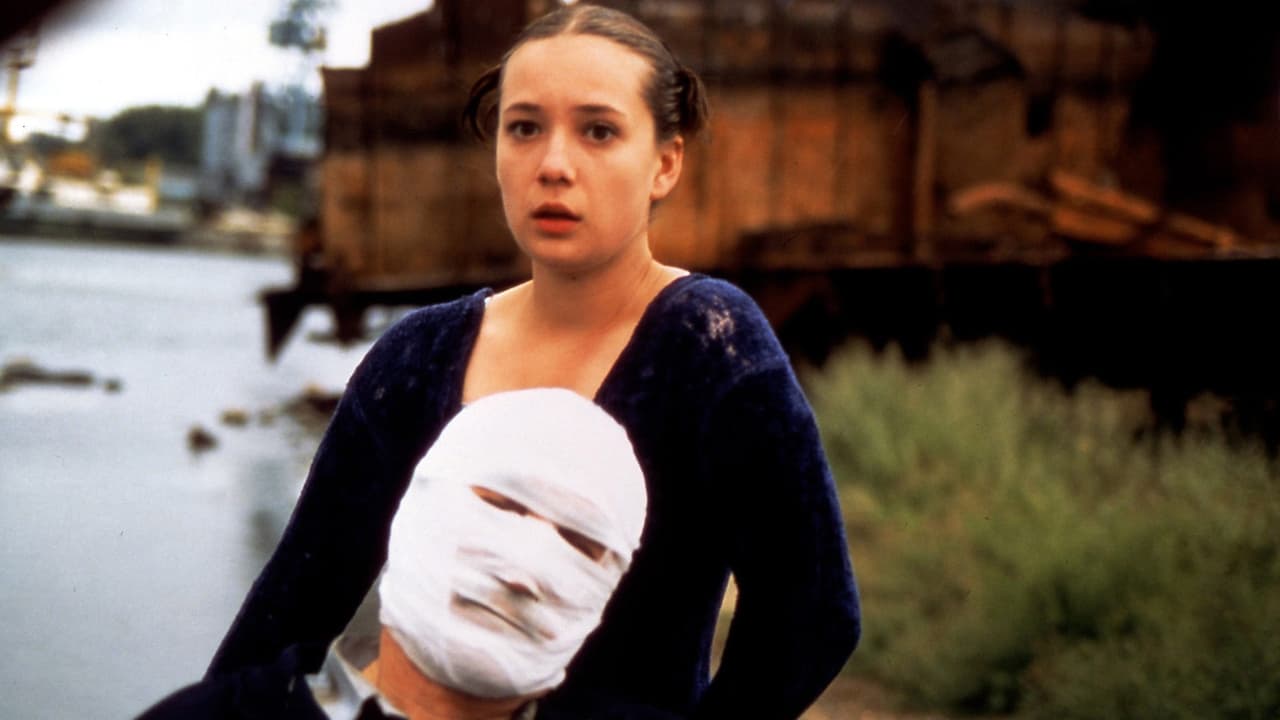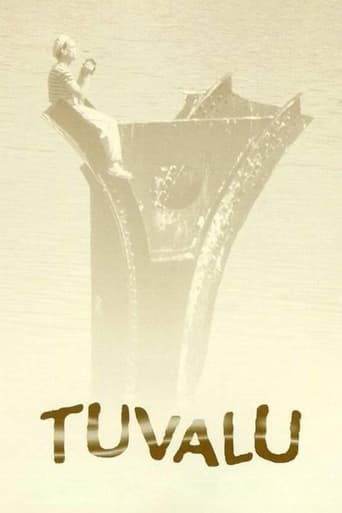

I had a different experience with this movie - it never got charming, or delightful, or funny for me. one big clue that this was not your typical movie was that the label gave no indication of the Ianguage(s) spoken in the film. another was the lack of choices re subtitles.I found the lack of dialogue annoying, especially when accompanied by exaggerated facial expressions as it almost always was. The wildly inconsistent development of the feeble plot was puzzling. Were there characters, or only vague gestures? was there even a plot?on a separate matter, I'm getting prompted to correct the spelling of "dialogue", with the suggested substitute of "dialogue". maybe this movie in its entirety, including the IMDb portion, is designed to puzzle, or amaze, but I'm getting more irked than amused.
... View MoreWhen some movies fail, it's boring. When some movies fail, it's hilarious. When some movies fail, it's grimly satisfying. Tuvalu is a movie that only just fails, and it's almost agonizing how close it comes to wonderousness.Like the British film Hotel Splendide, Tuvalu is an atmospheric fantasy, the central character of which is a building populated by a supporting cast of whimsical caricatures, mostly Adorable but occasionally Evil. Both films are melancholy and eccentric, and both draw widely on an aesthetic of detritus, on the cobbled-together and the half-broken, on jumping, jerking, smoking, gurgling machines insecurely constructed of loose bolts and clanking valves. And both employ the same central motifs water and the state of being marooned. In Hotel Splendide, hydrophobia maroons the young and Adorable Stanley Smith (Hugh O'Conor) on the damp and dreary island where the run-down health spa Hotel Splendide has settled its grey, ungainly (once-majestic, once-romantic) bulk. Will the pert and rather noisy Kath (Toni Collette), who arrives to fill the position of cook, be able to save him? In Tuvalu, the boyish and (sort of) Adorable Anton (Denis Lavant) is marooned in the immense, run-down (once-majestic, once-romantic) building where the murky community swimming pool is housed, restrained from leaving perhaps by a fear of the outside world or possibly by a fear of lace-up shoes. Will the pert and (way too) Adorable Eva (Chulpan Khamatova), who comes with her father to swim at the pool, and who becomes Anton's enemy but also his beloved, be able to save him? Tuvalu has much, much, much to recommend it. The stylized and pointed avoidance of dialogue is a bit precious, but director Veit Helmer carries it off only just. The complicated and baroque malfunctions of the architecture and its plumbing are ingenious, and the machinations of Anton and various pool patrons and other characters to save the building from demolition by masking its various deficiencies with complicated tricks and childish cosmetic alterations are winning, but the gleeful scene in which the complex conspiracy to deceive the building inspector takes place is somewhat over-choreographed, too delightful somehow, too ready to morph into a Broadway musical, with the scurrying up and down stairs, the popping in and out of heads from behind shower stall doors, the rapid cross-signaling and mis-signaling via the tapping of pipes. The scenes of the decrepit patrons paddling in the pool are languorous, luscious, balletic, but the quirks of the patrons themselves are too easy, too cartooned, and too familiar an old woman paddling herself in an inner tube with crutches, grungy, kindly sailors in tattered suits. Karl (Philippe Clay), the proprietor, the father of Anton and Anton's villainous brother Gregor (Terrence Gillespie), who is not only literally blind but blind as well to the disrepair and disuse into which the pool has fallen, is a marvelous figure dictatorial, terrifying but beloved, and artificially inflated but his eventual death is artificially inflated too, into a cumbersome and top-heavy symbol of brotherly rivalry and paternal betrayal.Helmer has been successful in creating an entire, intact world, and any film with this to its credit deserves to be seen. The particular offerings by which patrons can gain admission to the pool, the particular method Eva and Anton use to spy on each other's dreams, the incredibly thorough and cohesive design of both the aesthetics of the building and the functioning of its many complex parts: elements like these imply an entire civilization, an alternate world with its own social structure, physical laws, and geography, of which the village we see in the film is only a small part. The implication of this other reality, which is like ours but is not quite ours, is gracefully and cunningly accomplished. This is a work of real imagination. And to criticize Helmer for his caricaturing of his characters is not quite fair, as this is precisely his objective. But the technique of caricature, of reducing and simplifying human beings, is only productive if, by eliminating or distorting finer shades of meaning, other meanings are revealed. In Tuvalu, the stylization is so affected, rather than effective. Gillespie turns in a terrifically energetic and clownish performance as the grasping and psychotic Gregor, but if he waxes hysterical and strains at the limits of tolerability only in order to emphasize the evils of avarice and the soullessness of progress tired themes, indeed then have his efforts really been worthwhile? Khamatova squeaks and goggles and pouts and puckers for all she's worth, but her role in the film is entirely limited to a plot device. Certainly her actions are absolutely intrinsic to the events that unfold, but the personality of her character is utterly self-serving. She could have played the role like a wooden mannequin, or like a sad-eyed siren, or like a histrionic heroine, and the film would have continued apace. She is a machine for moving plot, her robotic heart disguised beneath a sickly-sweet frosting of giggles and winks, and in this and other aspects of Tuvalu, Helmer does not merely play with superficiality, but is superficial.Superficiality, yes, but a hell of a set designer. And this would be a wonderful movie for children whose parents don't object to a bit of nudity, a blow-up sex doll, and a couple of murders. Making a double feature out of this film and Hotel Splendide would assuredly cast each film in a more interesting light than viewing either independently. Still, even on its own merits alone, Tuvalu is one of the world's best failures.
... View MoreI attended the preview screening of "Tuvalu" for one simple reason - it was the first film of the day and fit into my schedule. Having read a brief synopsis of the film, I went in with mixed expectations - the review snippets lauded the film, but could a two-hour black and white film largely bereft of dialogue really be that entertaining? Please pass the crow... Set in a dilapidated indoor swimming pool (the Central Baths in Sofia), the film details the efforts of Anton, a clueless dreamer who yearns to sail the world, and Martha, the button obsessed cashier, to maintain the illusion for Anton's blind father that business is thriving. Working to sabotage their efforts is Gregor - Anton's brother - an amoral developer who is determined to raze the entire town and construct a sprawling condominium complex. Gregor engineers an accident that seems certain to doom the business and in the process steals away Eva, the beautiful woman of Anton's dreams. Will Gregor's dastardly plan succeed? It is difficult to categorize this film as it refuses to fit neatly within the confines of any particular genre. Taken on its simplest merits it is a slapstick comedy in the tradition of the Marx Brothers, Chaplin and the Keystone Cops. On this level, alone it will satisfy most viewers. A closer examination reveals a beautiful fairly tale with an innocent dreamer fighting to save his world and loved ones from evil. Finally, there is the none- too -subtle rail against the freight train of modernization, particularly relevant in many areas of post-Communist where vast construction projects are radically altering the cityscapes at the expense of history. However, one need look no further that our own city to see this -only recently have serious efforts been made to safeguard heritage buildings in Vancouver - some fear it may already be too late. Originally filmed in black and white, the stock was laboriously tinted to give the interior shots take a Sepia tone and the exterior shots a muddy turquoise- grey, providing further contrast for the story elements. The visual experience is further enhanced by masterful cinematography, most notably the underwater sequences, which take on a wondrous ethereal quality. The sound engineers have also created a richly diverse auditory realm that meshes uncannily with the onscreen action. Finally, the exaggerated expressiveness of the actors, both emotive and physical keep the action flowing seamlessly. If you are in search of an unusual, intriguing film, look no further.
... View MoreI had the chance to see this movie in the Porto, Portugal film festival Fantasporto 2000. The story revolves around a decadent public swimming pool, run by a blind old man who's mind still lives in the building's days of glory. It focuses on the people still using it, and on the persons still working there: a woman with a fixation on buttons and one of the old man's sons, who struggles to keep the building alive. The antagonist is the old man's other son who eagerly waits for the destruction of the building so he can build condo's.I found the concept of making a film without dialogs very interesting. Although people might think this could make the film boring and hard to follow, this doesn't happen at all. Merit goes to the actors, who deliver a very expressive and quality performance, without falling into ridicule, and to the rhythm given to the plot.Regarding directing and photography, all is presented neatly, but I can't help mentioning the similarities to Emir Kusturica's (namely in the portraying of the 'post-apocalyptic' universe and the nonsense touch of the plot) and to Jeunet & Caro's work (the building and the 'impossible romance' between the main characters is shown very similarly to Delicatessen). Although this impairs a bit the final result, I believe that in the end it is a nice movie which most people will enjoy and be surprised with (specially if they haven't seen any Kusturica or Jeunet & Caro movie).
... View More